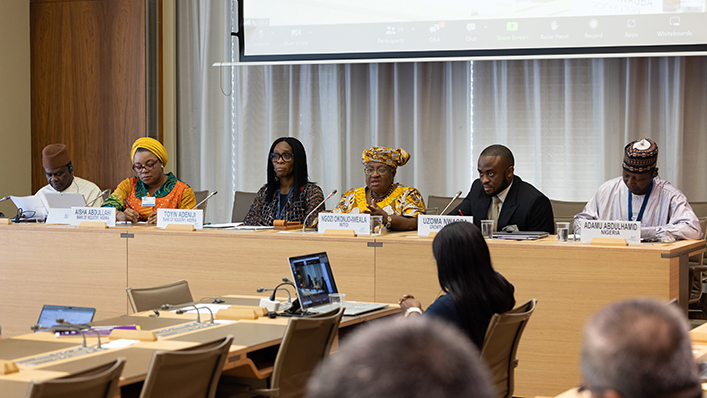
The COVID-19 pandemic has played an important role in accelerating digital connectivity, DG Okonjo-Iweala stressed, citing two reports launched on Day 1 of the Global Review. “The pandemic also underscored shortcomings,” she noted, “such as underdeveloped physical and regulatory infrastructure, unaffordable connections, and limited information and communications technology skills, especially among MSMEs”.
With a population of over 1.3 million – representing one-sixth of the world’s population – Africa accounts for only 3 per cent of global trade. The Growth Platform was created in 2016 in Nigeria – Africa’s most populated nation – to help marginalized groups tap into the benefits that digital trade brings to economic growth and the achievement of development objectives.
The Growth Platform’s Chief Operations Officer, Uzoma Nwagba, explained how this support is particularly needed by MSMEs, which account for 51 per cent of Nigeria’s outputs and employ 76 per cent of the country’s labour force. The Growth Platform places particular focus on women-owned enterprises, which represent 60 per cent of MSMEs in Nigeria, and on young entrepreneurs. Through its various partnerships, including with the World Bank, the Platform seeks to reach 25 million MSMEs by 2025.
Mr Nwagba cited the development of formal finance as a major challenge for Nigeria, with many businesses having limited access to bank accounts and loans. The Growth Platform seeks to help marginalized businesses overcome financial exclusion by providing them with a visual identity and funding and by helping them increase their productivity and competitiveness.
The Growth Platform is financed by Nigeria’s Bank of Industry, which raised a total of USD 472 million to help MSMEs set up projects, diversify production capacity and enhance trade infrastructure. The Bank’s Executive Director – Toyin Adeniji – said the objective is to enhance MSMEs’ access to markets, information and technology so that they can better recover from the COVID-19 crisis and build resilience to future economic shocks.
Nigeria’s WTO Ambassador, Adamu Abdulhamid, noted his country’s engagement in the SheTrades initiative established by the International Trade Centre to connect women entrepreneurs to markets. In addition to having marked 24 October as “Digital Nigeria Day”, the government is also implementing the “National Digital Economy Policy and Strategy 2020-2030″, with a view to furthering Nigeria’s participation in global trade.
The speakers emphasized the key role the WTO plays in helping to bring about inclusive global trade. DG Okonjo-Iweala drew attention to Nigeria’s participation in the WTO e-commerce initiative, which “could help provide a common framework of rules that would enable a scale up of digital skills”, especially for MSMEs, she said.
More information on the session can be found here.
Share
Reach us to explore global export and import deals